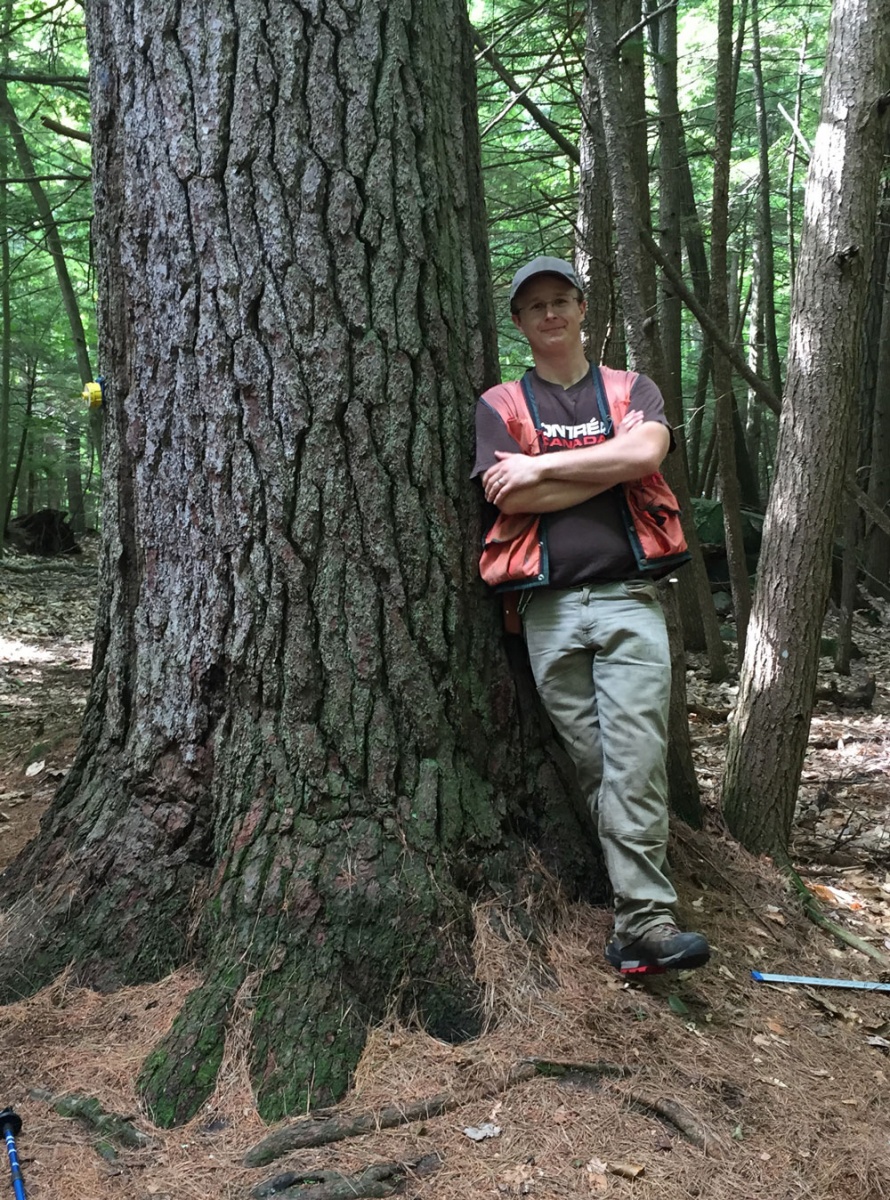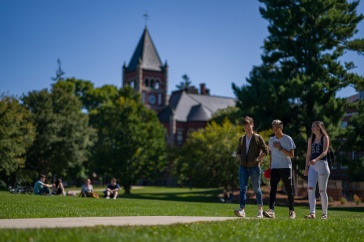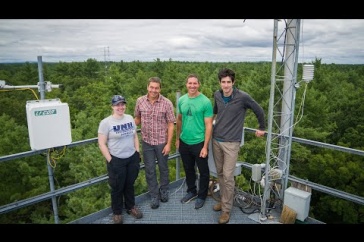These three UNH forestry alumni have followed different paths to their work in the field but all agree they love the work they do.

Ethan Belair ’12, a natural resources field specialist and forester for Hillsborough County with UNH Cooperative Extension, knows firsthand how many paths forestry graduates can take.
“Most people think forestry must be all about the trees and that a forester spends all their time in the woods,” he says, “but there’s much more to it than that. Whether it’s foresters, wildlife biologists, loggers that I work with or landowners I work for, I spend a lot of time with people.” He also spends quite a bit of time working with the latest technology. “GIS and mapmaking are the obvious essentials of foresters’ technological knowhow, but I also spend time with handheld data-loggers, analyzing data, writing and editing documents, creating figures and even have learned to write computer code as a part of my forestry work,” he says.
Is his work what he hoped for back in his undergraduate days? “No,” Belair says, “it’s way better than I ever thought it would be. I love the variety. I don’t end up having to do the same thing every single day.”
Belair’s days vary from working with landowners on options for managing invasive species to “meeting with a group of land managers to plan out experimental timber harvesting for New England cottontail habitat, mapping town-owned forestland, going to conservation commission meetings, walking an active harvest site with a consulting forester,” adding, “It’s never boring.”

Benjamin Farina ’11 is a silviculturist with the U.S. Forest Service, White Mountain National Forest (WMNF), Pemigewassett Ranger District. Silviculture is a branch of forestry that focuses on the development and care of forests.
Early on, Farina realized he could take many paths with a forestry degree, from research to public land management to consulting. “It wasn’t until my last year at UNH that I narrowed down exactly what I wanted to do, and at that point, realized I had all the tools to be successful,” he says, adding that while working for the WMNF, he was accepted into the National Advanced Silviculture Program. “Today, I am working through the rigorous coursework and project requirements of the program. My goal is to complete the program by defending my project in front of a regional review panel in the spring,” he says.
What does he enjoy about his work? “I have always been someone who loves teamwork and problem-solving,” he says. “I look at ecosystem management as a puzzle with many pieces in place but also some still missing. There are so many little tweaks you can do as a land manager that can greatly affect the dynamics of a greater ecosystem. It is up to our team of resource managers and me to find what piece best fits within the puzzle.”

Wendy Weisiger ‘01 is the managing forester for the Society for the Protection of NH Forests, New Hampshire’s oldest land trust, where she was hired 15 years ago as a field forester.
“We are the state’s third-largest private landowner with over 56,000 acres on about 185 reservations statewide,” she explains. “It’s my responsibility to oversee stewardship of all of these reservations. One of my main duties involves overseeing our timber-harvesting program. We aim to treat 600 to 900 acres annually with about eight to 14 individual harvests.” Weisiger also supervises two staff foresters who inventory and write management plans for the trust’s forests.
During her studies at UNH, she recalls, she knew she wanted to work in the woods but wasn’t sure what that might entail.
“My career has turned out to be so much more than strict forestry. I enjoy all of the aspects of my job including outreach, conservation, recreation and land stewardship,” she says, adding, “I spend much time doing outreach and education about forestry.” She also works closely with the trust’s 175 land steward volunteers.
Weisiger says she especially loves that in working for the Society for the Protection of NH Forests, “I know that the land we are managing will be here for the next generation.”
Getting the Job
As recent UNH grads, was it difficult to find work in this field? Belair and Farina say not at all.
“I’ve turned down multiple job offers since graduation. Good jobs are still competitive, but any graduate who has paid attention in school, and maybe had a couple summer internships/jobs, should have no problem finding steady work,” Belair says.
Farina’s path to his job began right after his freshman year at UNH. He spent two summers working as a forestry technician on sale preparation and timber stand improvement and volunteered during his winter and spring breaks to gain seasonal experience, he recalls, and went on to complete wildland firefighter training, traveling to Canada to fight his first wildfire. “The year following my junior year, I was accepted into the Student Career Experience Program, similar to today’s Pathways Program. This student program offered valuable professional experience and a permanent job offer by the White Mountain National Forest as a forester upon graduation.”
Making a Difference
UNH forestry graduates are having a direct impact on the Granite State.
As Belair explains, a conversation with a landowner about improving the habitat on their property could make a difference for decades to come. “If I can help educate loggers about the principles of forest ecology, they might apply those to the thousands of acres of woods they harvest over their career, improving the residual quality of the forest,” he says. “If I take some kids on a nature hike outside their middle school, and can help instill a love of the natural world and a respect for the resources we have, who knows what those kids will grow up to do?”
"The forest is a key part of what makes New Hampshire what it is. It’s important for our economy, the health of our citizens and the rural character that draws so many people here."
In his work, Farina helps manage the White Mountain National Forest for diversity. “We don’t know what is around the corner in the future,” he says. “Improving the resiliency and health of our forests puts them in a better situation to withstand impacts we can’t predict in the future, whether that is insect or disease outbreak or changes in climate or perhaps something else.”
Weisiger’s work also has a direct impact on the state. “As a land manager and forester, I get to work on the ground we own to implement habitat projects for rare, threatened and endangered species and natural communities,” she says. “I also spend a good deal of time educating the public about responsible forestry through things like hosting forestry tours, teaching volunteers, and through my work on the board of NH Project Learning Tree.”
The Society for the Preservation of NH Forests also works on statewide environmental advocacy, and Weisiger provides input to these legislative efforts.
“Most importantly,” she says, “I work with our partners throughout New Hampshire and consulting foresters on our lands to practice responsible, sustainable forestry, and we encourage other small woodlot owners to implement responsible management on their lands through our outreach programs.”
Belair sums up why forestry is such an important career in the Granite State: “The forest is a key part of what makes New Hampshire what it is. It’s important for our economy, the health of our citizens and the rural character that draws so many people here. I have the opportunity to affect how people relate to the forest and, therefore, the long-term outcomes for our landscape.”
Interested in following a path to a career in forestry? UNH’s College of Life Sciences and Agriculture has all the details.
-
Written By:
Jennifer Saunders | Communications and Public Affairs | jennifer.saunders@unh.edu | 603-862-3585



















































